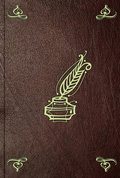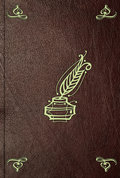
Вашингтон Ирвинг
Bracebridge Hall, or The Humorists
It would take away, too, from that loneliness and destitution which we are apt to feel more and more as we get on in our pilgrimage through the wilderness of this world, and find that those who set forward with us, lovingly and cheerily, on the journey, have, one by one, dropped away from our side. Place the superstition in this light, and I confess I should like to be a believer in it. I see nothing in it that is incompatible with the tender and merciful nature of our religion, nor revolting to the wishes and affections of the heart.
There are departed beings that I have loved as I never again shall love in this world; – that have loved me as I never again shall be loved! If such beings do ever retain in their blessed spheres the attachments which they felt on earth – if they take an interest in the poor concerns of transient mortality, and are permitted to hold communion with those whom they have loved on earth, I feel as if now, at this deep hour of night, in this silence and solitude, I could receive their visitation with the most solemn, but unalloyed delight.
In truth, such visitations would be too happy for this world; they would be incompatible with the nature of this imperfect state of being. We are here placed in a mere scene of spiritual thraldom and restraint. Our souls are shut in and limited by bounds and barriers; shackled by mortal infirmities, and subject to all the gross impediments of matter. In vain would they seek to act independently of the body, and to mingle together in spiritual intercourse. They can only act here through their fleshy organs. Their earthly loves are made up of transient embraces and long separations. The most intimate friendship, of what brief and scattered portions of time does it consist! We take each other by the hand, and we exchange a few words and looks of kindness, and we rejoice together for a few short moments-and then days, months, years intervene, and we see and know nothing of each other. Or, granting that we dwell together for the full season of this our mortal life, the grave soon closes its gates between us, and then our spirits are doomed to remain in separation and widowhood; until they meet again in that more perfect state of being, where soul will dwell with soul in blissful communion, and there will be neither death, nor absence, nor any thing else to interrupt our felicity.
* * * * *
In the foregoing paper, I have alluded to the writings of some of the old Jewish rabbis. They abound with wild theories; but among them are many truly poetical flights; and their ideas are often very beautifully expressed. Their speculations on the nature of angels are curious and fanciful, though much resembling the doctrines of the ancient philosophers. In the writings of the Rabbi Eleazer is an account of the temptation of our first parents, and the fall of the angels, which the parson pointed out to me as having probably furnished some of the groundwork for "Paradise Lost."
According to Eleazer, the ministering angels said to the Deity, "What is there in man, that thou makest him of such importance? Is he any thing else than vanity? for he can scarcely reason a little on terrestrial things." To which God replied, "Do you imagine that I will be exalted and glorified only by you here above? I am the same below that I am here. Who is there among you that can call all the creatures by their names?" There was none found among them that could do so. At that moment Adam arose, and called all the creatures by their names. Seeing which, the ministering angels said among themselves, "Let us consult together how we may cause Adam to sin against the Creator, otherwise he will not fail to become our master."
Sammaël, who was a great prince in the heavens, was present at this council, with the saints of the first order, and the seraphim of six bands. Sammaël chose several out of the twelve orders to accompany him, and descended below, for the purpose of visiting all the creatures which God had created. He found none more cunning and more fit to do evil than the serpent.
The Rabbi then treats of the seduction and the fall of man; of the consequent fall of the demon, and the punishment which God inflicted on Adam, Eve, and the serpent. "He made them all come before him; pronounced nine maledictions on Adam and Eve, and condemned them to suffer death; and he precipitated Sammaël and all his band from heaven. He cut off the feet of the serpent, which had before the figure of a camel (Sammaël having been mounted on him), and he cursed him among all beasts and animals."
GENTILITY
– True Gentrie standeth in the trade
Of virtuous life, not in the fleshy line;
For bloud is knit, but Gentrie is divine.
– Mirror for Magistrates.
I have mentioned some peculiarities of the Squire in the education of his sons; but I would not have it thought that his instructions were directed chiefly to their personal accomplishments. He took great pains also to form their minds, and to inculcate what he calls good old English principles, such as are laid down in the writings of Peachem and his contemporaries. There is one author of whom he cannot speak without indignation, which is Chesterfield. He avers that he did much, for a time, to injure the true national character, and to introduce, instead of open, manly sincerity, a hollow, perfidious courtliness. "His maxims," he affirms, "were calculated to chill the delightful enthusiasm of youth; to make them ashamed of that romance which is the dawn of generous manhood, and to impart to them a cold polish and a premature worldliness.
"Many of Lord Chesterfield's maxims would make a young man a mere man of pleasure; but an English gentleman should not be a mere man of pleasure. He has no right to such selfish indulgence. His ease, his leisure, his opulence, are debts due to his country, which he must ever stand ready to discharge. He should be a man at all points; simple, frank, courteous, intelligent, accomplished, and informed; upright, intrepid, and disinterested; one that can mingle among freemen; that can cope with statesmen; that can champion his country and its rights, either at home or abroad. In a country like England, where there is such free and unbounded scope for the exertion of intellect, and where opinion and example have such weight with the people, every gentleman of fortune and leisure should feel himself bound to employ himself in some way towards promoting the prosperity or glory of the nation. In a country where intellect and action are trammelled and restrained, men of rank and fortune may become idlers and triflers with impunity; but an English coxcomb is inexcusable; and this, perhaps, is the reason why he is the most offensive and insupportable coxcomb in the world."
The Squire, as Frank Bracebridge informs me, would often hold forth in this manner to his sons, when they were about leaving the paternal roof; one to travel abroad, one to go to the army, and one to the university. He used to have them with him in the library, which is hung with the portraits of Sidney, Surrey, Raleigh, Wyat, and others. "Look at those models of true English gentlemen, my sons," he would say with enthusiasm; "those were men that wreathed the graces of the most delicate and refined taste around the stern virtues of the soldier; that mingled what was gentle and gracious, with what was hardy and manly; that possessed the true chivalry of spirit, which is the exalted essence of manhood. They are the lights by which the youth of the country should array themselves. They were the patterns and idols of their country at home; they were the illustrators of its dignity abroad. 'Surrey,' says Camden, 'was the first nobleman that illustrated his high birth with the beauty of learning. He was acknowledged to be the gallantest man, the politest lover, and the completest gentleman of his time.' And as to Wyat, his friend Surrey most amiably testifies of him, that his person was majestic and beautiful, his visage 'stern and mild;' that he sung, and played the lute with remarkable sweetness; spoke foreign languages with grace and fluency, and possessed an inexhaustible fund of wit. And see what a high commendation is passed upon these illustrious friends: 'They were the two chieftains, who, having travelled into Italy, and there tasted the sweet and stately measures and style of the Italian poetry, greatly polished our rude and homely manner of vulgar poetry from what it had been before, and therefore may be justly called the reformers of our English poetry and style.' And Sir Philip Sidney, who has left us such monuments of elegant thought, and generous sentiment, and who illustrated his chivalrous spirit so gloriously in the field. And Sir Walter Raleigh, the elegant courtier, the intrepid soldier, the enterprising discoverer, the enlightened philosopher, the magnanimous martyr. These are the men for English gentlemen to study. Chesterfield, with his cold and courtly maxims, would have chilled and impoverished such spirits. He would have blighted all the budding romance of their temperaments. Sidney would never have written his Arcadia, nor Surrey have challenged the world in vindication of the beauties of his Geraldine. "These are the men, my sons," the Squire will continue, "that show to what our national character may be exalted, when its strong and powerful qualities are duly wrought up and refined. The solidest bodies are capable of the highest polish; and there is no character that may be wrought to a more exquisite and unsullied brightness, than that of the true English gentleman."
When Guy was about to depart for the army, the Squire again took him aside, and gave him a long exhortation. He warned him against that affectation of cool-blooded indifference, which he was told was cultivated by the young British officers, among whom it was a study to "sink the soldier" in the mere man of fashion. "A soldier," said he, "without pride and enthusiasm in his profession, is a mere sanguinary hireling. Nothing distinguishes him from the mercenary bravo, but a spirit of patriotism, or a thirst for glory. It is the fashion now-a-days, my son," said he, "to laugh at the spirit of chivalry; when that spirit is really extinct, the profession of the soldier becomes a mere trade of blood." He then set before him the conduct of Edward the Black Prince, who is his mirror of chivalry; valiant, generous, affable, humane; gallant in the field. But when he came to dwell on his courtesy toward his prisoner, the king of France; how he received him in his tent, rather as a conqueror than as a captive; attended on him at table like one of his retinue; rode uncovered beside him on his entry into London, mounted on a common palfrey, while his prisoner was mounted in state on a white steed of stately beauty; the tears of enthusiasm stood in the old gentleman's eyes.
Finally, on taking leave, the good Squire put in his son's hands, as a manual, one of his favourite old volumes, the life of the Chevalier Bayard, by Godefroy; on a blank page of which he had written an extract from the Morte d'Arthur, containing the eulogy of Sir Ector over the body of Sir Launcelot of the Lake, which the Squire considers as comprising the excellencies of a true soldier. "Ah, Sir Launcelot! thou wert head of all Christian knights; now there thou liest: thou wert never matched of none earthly knights-hands. And thou wert the curtiest knight that ever bare shield. And thou wert the truest friend to thy lover that ever bestrood horse; and thou wert the truest lover of a sinfull man that ever loved woman. And thou wert the kindest man that ever strook with sword; and thou wert the goodliest person that ever came among the presse of knights. And thou wert the meekest man and the gentlest that ever eate in hall among ladies. And thou wert the sternest knight to thy mortal foe that ever put speare in the rest."
FORTUNE-TELLING
Each city, each town, and every village,
Affords us either an alms or pillage.
And if the weather be cold and raw.
Then in a barn we tumble on straw.
If warm and fair, by yea-cock and nay-cock,
The fields will afford us a hedge or a hay-cock.
– Merry Beggars.
As I was walking one evening with the Oxonian, Master Simon, and the general, in a meadow not far from the village, we heard the sound of a fiddle, rudely played, and looking in the direction from whence it came, we saw a thread of smoke curling up from among the trees. The sound of music is always attractive; for, wherever there is music, there is good-humour, or good-will. We passed along a footpath, and had a peep through a break in the hedge, at the musician and his party, when the Oxonian gave us a wink, and told us that if we would follow him we should have some sport.
It proved to be a gipsy encampment, consisting of three or four little cabins, or tents, made of blankets and sail-cloth, spread over hoops that were stuck in the ground. It was on one side of a green lane, close under a hawthorn hedge, with a broad beech-tree spreading above it. A small rill tinkled along close by, through the fresh sward, that looked like a carpet.
A tea-kettle was hanging by a crooked piece of iron, over a fire made from dry sticks and leaves, and two old gipsies, in red cloaks, sat crouched on the grass, gossiping over their evening cup of tea; for these creatures, though they live in the open air, have their ideas of fireside comforts. There were two or three children sleeping on the straw with which the tents were littered; a couple of donkeys were grazing in the lane, and a thievish-looking dog was lying before the fire. Some of the younger gipsies were dancing to the music of a fiddle, played by a tall, slender stripling, in an old frock-coat, with a peacock's feather stuck in his hat-band.
As we approached, a gipsy girl, with a pair of fine, roguish eyes, came up, and, as usual, offered to tell our fortunes. I could not but admire a certain degree of slattern elegance about the baggage. Her long black silken hair was curiously plaited in numerous small braids, and negligently put up in a picturesque style that a painter might have been proud to have devised.
Her dress was of figured chintz, rather ragged, and not over-clean but of a variety of most harmonious and agreeable colours; for these beings have a singularly fine eye for colours. Her straw hat was in her hand, and a red cloak thrown over one arm.
The Oxonian offered at once to have his fortune told, and the girl began with the usual volubility of her race; but he drew her on one side, near the hedge, as he said he had no idea of having his secrets overheard. I saw he was talking to her instead of she to him, and by his glancing towards us now and then, that he was giving the baggage some private hints. When they returned to us, he assumed a very serious air. "Zounds!" said he, "it's very astonishing how these creatures come by their knowledge; this girl has told me some things that I thought no one knew but myself!" The girl now assailed the general: "Come, your honour," said she, "I see by your face you're a lucky man; but you're not happy in your mind; you're not, indeed, sir; but have a good heart, and give me a good piece of silver, and I'll tell you a nice fortune."
The general had received all her approaches with a banter, and had suffered her to get hold of his hand; but at the mention of the piece of silver, he hemmed, looked grave, and, turning to us, asked if we had not better continue our walk. "Come, my master," said the girl, archly, "you'd not be in such a hurry, if you knew all that I could tell you about a fair lady that has a notion for you. Come, sir; old love burns strong; there's many a one comes to see weddings, that go away brides themselves." – Here the girl whispered something in a low voice, at which the general coloured up, was a little fluttered, and suffered himself to be drawn aside under the hedge, where he appeared to listen to her with great earnestness, and at the end paid her half-a-crown with the air of a man that has got the worth of his money. The girl next made her attack upon Master Simon, who, however, was too old a bird to be caught, knowing that it would end in an attack upon his purse, about which he is a little sensitive. As he has a great notion, however, of being considered a royster, he chucked her under the chin, played her off with rather broad jokes, and put on something of the rake-helly air, that we see now and then assumed on the stage, by the sad-boy gentleman of the old school. "Ah, your honour," said the girl, with a malicious leer, "you were not in such a tantrum last year, when I told you about the widow, you know who; but if you had taken a friend's advice, you'd never have come away from Doncaster races with a flea in your ear!" There was a secret sting in this speech, that seemed quite to disconcert Master Simon. He jerked away his hand in a pet, smacked his whip, whistled to his dogs, and intimated that it was high time to go home. The girl, however, was determined not to lose her harvest. She now turned upon me, and, as I have a weakness of spirit where there is a pretty face concerned, she soon wheedled me out of my money, and, in return, read me a fortune; which, if it prove true, and I am determined to believe it, will make me one of the luckiest men in the chronicles of Cupid.
I saw that the Oxonian was at the bottom of all this oracular mystery, and was disposed to amuse himself with the general, whose tender approaches to the widow have attracted the notice of the wag. I was a little curious, however, to know the meaning of the dark hints which had so suddenly disconcerted Master Simon; and took occasion to fall in the rear with the Oxonian on our way home, when he laughed heartily at my questions, and gave me ample information on the subject.
The truth of the matter is, that Master Simon has met with a sad rebuff since my Christmas visit to the Hall. He used at that time to be joked about a widow, a fine dashing woman, as he privately informed me. I had supposed the pleasure he betrayed on these occasions resulted from the usual fondness of old bachelors for being teased about getting married, and about flirting, and being fickle and false-hearted. I am assured, however, that Master Simon had really persuaded himself the widow had a kindness for him; in consequence of which he had been at some extraordinary expense in new clothes, and had actually got Frank Bracebridge to order him a coat from Stultz. He began to throw out hints about the importance of a man's settling himself in life before he grew old; he would look grave, whenever the widow and matrimony were mentioned in the same sentence; and privately asked the opinion of the Squire and parson about the prudence of marrying a widow with a rich jointure, but who had several children.
An important member of a great family connexion cannot harp much upon the theme of matrimony, without its taking wind; and it soon got buzzed about that Mr. Simon Bracebridge was actually gone to Doncaster races, with a new horse; but that he meant to return in a curricle with a lady by his side. Master Simon did, indeed, go to the races, and that with a new horse; and the dashing widow did make her appearance in a curricle; but it was unfortunately driven by a strapping young Irish dragoon, with whom even Master Simon's self-complacency would not allow him to venture into competition, and to whom she was married shortly after.
It was a matter of sore chagrin to Master Simon for several months, having never before been fully committed. The dullest head in the family had a joke upon him; and there is no one that likes less to be bantered than an absolute joker. He took refuge for a time at Lady Lillycraft's, until the matter should blow over; and occupied himself by looking over her accounts, regulating the village choir, and inculcating loyalty into a pet bulfinch, by teaching him to whistle "God save the King."
He has now pretty nearly recovered from the mortification; holds up his head, and laughs as much as any one; again affects to pity married men, and is particularly facetious about widows, when Lady Lillycraft is not by. His only time of trial is when the general gets hold of him, who is infinitely heavy and persevering in his waggery, and will interweave a dull joke through the various topics of a whole dinner-time. Master Simon often parries these attacks by a stanza from his old work of "Cupid's Solicitor for Love:"
"'Tis in vain to wooe a widow over long,
In once or twice her mind you may perceive;
Widows are subtle, be they old or young,
And by their wiles young men they will deceive."







